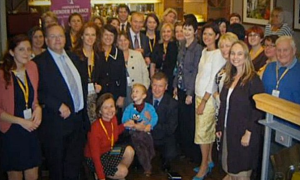 The Telegraph is reporting that former Gordon Brown special advisor Damian McBride is about to publish a memoir. Going by his blog, this is likely to be the best warts-and-all peek behind the New Labour curtain to date.
The Telegraph is reporting that former Gordon Brown special advisor Damian McBride is about to publish a memoir. Going by his blog, this is likely to be the best warts-and-all peek behind the New Labour curtain to date.
He’s got plenty of warts himself, of course, and I’m certainly not praising his character (especially his “Admiral Byng” technique set out below, plus the Red Rag stuff) or his policies, merely his writing.
Anyone who has any interest in how Westminster works should read the blog (assuming it doesn’t get taken down) and the book, no doubt. Some highlights from the last twelve months or so follow:
How the Budget is scored: written in the aftermath of Osborne’s caravan and pasty tax fiasco, and surely rapidly forwarded around the Treasury.
Anyone can come up with an idea for the Budget: members of the public who write in; NGOs and Business groups; other government departments; officials in HMRC; Treasury staff, special advisers and ministers; and of course the Chancellor himself. It would be nice to say they are all given equal weight and consideration, but the order I’ve put them in usually corresponds to the amount of effort the Treasury will put into developing their ideas.
Five Years On….The day GB became PM
In hushed tones, I was shown the ‘stand-alone computer’ through which No10 staff could use personal email accounts which were otherwise blocked by the Downing Street servers. “We don’t discuss this publicly,” I was told, “we don’t want people going on about ‘second Downing Street email systems’”
5 Years On: 24 Hours of Crisis Micro-Management: on the start of the foot and mouth outbreak.
GB gestured me in, hand over the mouthpiece on the phone: ‘Foot & Mouth. Bloody Foot & Mouth’. ‘Fuck me’, I said helpfully.
The Seven Year Hitch: being with Gordon when Tony Blair announced he’d serve a full third term.
[Number 11’s discipline] was also due – and I take full credit/responsibility for this – to my Admiral Byng approach to leaks. If anything did appear in the papers that was not from X, Y or Z, I would instantly name a culprit. I’d try and choose someone who was a decent suspect, but their guilt didn’t really matter – it was the assertion of their guilt that mattered. They would be cut out of meetings, removed from the circulation list for emails, and wherever they walked in the Treasury, people would mutter about their demise. The effect of this was to make the actual guilty party feel guilty as hell, and put the fear of God into everyone else in the Treasury about doing any leaking themselves. As for the poor Admiral Byngs, they’d usually recover after a while, and some of them were probably guilty anyway.
5 Years On: The Election That Never Was
I asked him who he wanted me to talk up as potential future leaders when I briefed this out to the media. His eyes narrowed again, and he reeled off surnames like a football manager naming his First XI: “Purnell. Miliband. Kelly. Burnham. Cooper. Balls. Miliband.” I replied: “You’ve already said Miliband” GB: “Both of them.” Me: “Really? You want me to say Ed Miliband?” He looked surprised: “You need to watch Ed Miliband, he’s the one to watch.”
Whither the Grid and then Why Did The Grid Wither?
And the reality is, for all its success as an organisational tool under New Labour, the grid and the ‘Upcoming Business’ document were the source of many a leak. A whole journalistic phrasebook exists because of it: “busting the grid” or “a bit of gridology”, all code for using the headlines in the grid to decipher an upcoming announcement.
Going To The Mattresses: the art of surviving a coup*
Britain’s modern party leaders are not ousted by stalking horses; they are dragged from their beds in the dead of night, and shot in the courtyard with a Sky News helicopter overhead. So it would be extremely foolish for anyone in No10 to take the complex rules required to mount a leadership challenge as a reason to relax.



